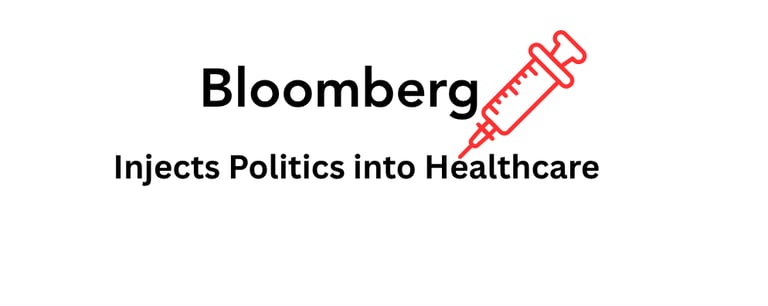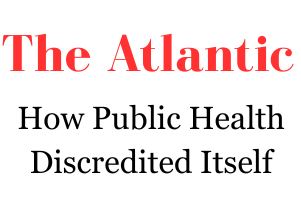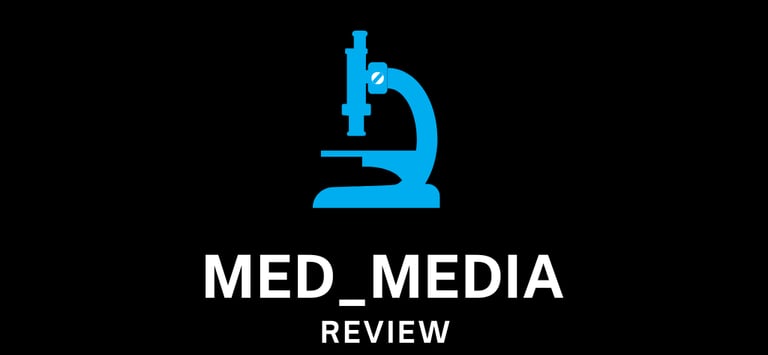

Let’s examine the partisan healthcare commentary on Bloomberg that we randomly stumbled into one day.
Bloomberg.com separates its opinion section from regular news coverage, which is standard practice for media outlets. Therefore, from a journalistic-integrity perspective, Bloomberg can inject all the politics it wants into this section. But we raise one concern: must healthcare always be intertwined with partisan politics? At Bloomberg, from what we’ve seen, yes.
Michael Bloomberg Weighs in
It starts at the top with Michael Bloomberg, the company founder, former New York City Mayor and Presidential candidate who wrote this editorial.
RFK Jr. Is Making America Sick Again 7.21.25
The media baron's partisan attacks continue with each passing sentence.
The first sentence reads:
“It’s not too late for Senate Republicans to begin correcting the worst mistake they’ve made this year: confirming Robert F. Kennedy Jr. as secretary of Health and Human Services.”
The worst mistake, really?
Presidents typically get their nominees for cabinet departments through the Senate, except in unusual cases. Oftentimes, this occurs because something comes up in their background that causes political liabilities.
Administrations set policy through personnel and HHS secretaries of both parties have a long record of Senate confirmation going back to the Carter Administration when HHS was created in its modern form.
Moreover, we’re surprised that Bloomberg cites the MAHA direction of HHS, given his own views on dietary choices and its relationship to obesity and chronic illness. Many will recall then-Mayor Bloomberg’s crusade against big-gulp sized sugary sodas.
It gets worse. Micheal Bloomberg wants to blame Republicans for measles.
“Democrats could hardly dream up a better line of attack than the one Kennedy is giving them, by turning the GOP into the party of measles — the Grand Old Pestilence.”
The dictionary defines “pestilence” as equating to the bubonic plague. As serious as measles is, it’s not the bubonic plague.
Finally, Bloomberg cites Sen. Bill Cassidy, the Louisiana Republican and physician who raised questions about RFK Jr.s nomination.
Cassidy ultimately voted to confirm RFK Jr. after working to assure safeguards for vaccine approvals through the CDC. Cassidy’s diligence in trying to support vaccines, however, only invites further partisan attack.
“The answer was always obvious. Kennedy never gave any indication that he would be changing his stripes, but Cassidy and his colleagues deceived themselves into thinking otherwise — or, worse, they knew better and simply buckled to political pressure, placing their own political careers above the lives of their constituents.”
The Drones Weigh In
The person at the top sets the tone for editorial and news coverage. Which worker bee in the open cubicle Bloomberg hive wants to cross the queen bee? None of them do.
Here are the other opinion articles that appeared at the same time.
The Quiet Obamacare Overhaul Needs a Loud Reveal 7.24.25
“As Trump dismantles the Affordable Care Act, millions of Americans could lose access to affordable health care - without knowing who to blame.”
Republicans Missed a Serious Shot at Medicaid Reform 7.24.25
“Recently passed legislation does little to address core flaws.”
NIH Budget Cuts Are a Setback for American Science 7.22.25
“As a declaration of national priorities, the White House’s blueprint sends a troubling signal.”
The Bottom Line
What do these articles have in common? They blame President Trump and Republicans for perceived failures in healthcare. There are many different ways to look at Obamacare tax credits, how best to reform Medicaid and NIH budget cuts. Apparently not at Bloomberg though.


There are few ten page articles in print media these days. As the headline indicates, this piece chronicles the politicization of healthcare going back 50 years, where the author cites numerous examples especially during Covid.
Here is an excerpt of the article that gets right to the point.
“…A noble profession has been corrupted by politics.”
Who wrote this?
Those are the words of author John Tierney. Tierney is a veteran reporter now part of the Manhattan Institute, a conservative think tank. He is a prolific contributor to the Institute’s City Journal covering a variety of topics, most notably challenging the nation’s Covid response.
As for the Atlantic, the magazine dates back to the Civil War era and today is perceived as a genteel, progressive media outlet properly placed next to the New Yorker on coffee tables of affluent east coast households. But hold on.
How did this get into the Atlantic?
We found this language on the “About Us” section of the magazine’s website regarding the Atlantic’s 19th century origins. “The free exchange of ideas across ideological lines was crucial to the great American experiment.”
Here, we give the Atlantic credit for holding to its ideals. That is, “the free exchange of ideas,” which has been stifled in our polarized media climate.
Key Points
• The CDC, created in the 1940’s to stop malaria, expanded its portfolio to include firearm fatalities, racism, and domestic violence.
• During Covid, the CDC dismissed its own pandemic protocols and followed China’s lead in requiring lockdowns, believing the country was stopping the spread of the virus.
• In 2020, an open letter signed by more than 1200 doctors, public health officials and academics supported Black Lives Matter protests, but not other public gatherings.
• Researchers including Jay Bhattacharya (now the NIH director) who questioned lock-down orthodoxy were smeared in the press and censured on social media.
The bottom line
The author asserts that to earn people’s respect, the public health profession must chose evidence over ideology.


Reporters at the Wall Street Journal were the first to examine questionable billing practices for UnitedHealth Group Medicare Advantage plans.
Let's get some context before diving into WSJ’s coverage. First, see the New York Times article, "UnitedHealth Grew to Be a Leviathan. Then Came the Backlash," in the Zoom Out section on the homepage which summarizes UnitedHealth's business model and examines other misfortunes to plague the company.
Medicare Advantage Background
MA plans accounted for $462 billion, or 45 percent, of Medicare spending in 2023, according to the Peter G. Peterson Foundation. UnitedHealth has more Medicare Advantage enrollees, at nearly 30%, than other market players such as Humana and CVS Health.
CMS pays private-sector insurers a base rate for each MA member. The insurers get additional revenue when their patients are diagnosed with certain conditions. This gives an incentive for insurers to “discover” and document additional diagnoses which are often done independently of patients’ own physicians.
WSJ Investigates
Pouring over CMS data, WSJ found that UnitedHealth members were more likely to have dubious diagnosis for more lucrative reimbursements than traditional Medicare and its MA competitors.
A diagnoses for diabetic cataracts, for example, can pay out up to $2700 a year according to the WSJ analysis. In all, WSJ reported that UnitedHealth coded higher cases of morbid obesity, heart failure, depression and emphysema all of which collect additional government money.
WSJ’s scrutiny of UnitedHealth’s Medicare Advantage billing practices began nearly a year ago with this article.
Insurers Pocketed $50 Billion From Medicare for Diseases No Doctor Treated 7.8.24
Then, earlier this year, WSJ was the first to report that DOJ launched a civil probe of the company’s billing practices.
DOJ Investigates Medicare Billing Practices at UnitedHealth 2.21.25
Fast forward to July of this year, and we see this headline which is reverberating in multiple media outlets.
UnitedHealth Confirms Justice Department Probes 7.24.25
The Bottom Line
Solid investigative reporting can spur legal action, and that is what happened here. MA plans are projected to increase federal spending in the years ahead, outpacing even traditional Medicare. There is widespread agreement on the need to control healthcare spending - all the more reason to recognize the important work of WSJ’s investigative team.






